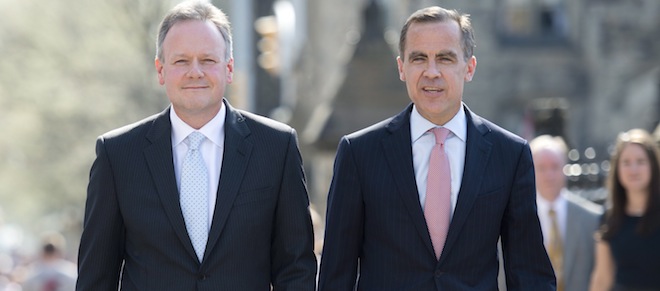What we’ll miss about Mark Carney
You judge us shallow for dwelling on performance style? Show a little pity.
Bank of Canada Governor designate Stephen Poloz walks with outgoing Governor Mark Carney as they make their way to a news conference in Ottawa, Thursday May 2, 2013. THE CANADIAN PRESS/Adrian Wyld
Share

On Stephen Poloz’s big day, as he basks in the media attention that comes with being named the next Governor of the Bank of Canada, let’s not resort to words like “dull.” There’s no need for that sort of talk. “Stolid” serves and doesn’t sound nearly as harsh.
Still, there sat Poloz in the National Press Theatre this afternoon, right beside the departing Mark Carney. It was impossible not to sag a bit at the thought of Ottawa reverting to being just a bit more its own cliché. You judge me shallow for dwelling on Carney’s performance style? Show a little pity. Consider those of us who jobs entail listening regularly to what’s intoned by the less, shall we say, dynamic of our current federal cabinet ministers.
And Carney’s ability to command willing attention—whether on stage in Davos or in studio with Strombo—wasn’t merely diverting. Because it was the charismatic Carney talking, we paid a tad more attention to, for instance, dire warnings about consumer debt loads. Even policy issues that touch that so intimately on the financial lives of most Canadians can’t compete for public attention unless leaders show at least a bit of flare.
Typically, we’d look for those skills in elected politicians. But there aren’t many in Prime Minister Stephen Harper’s Ottawa with that sort of knack. And now there will be one fewer in the senior ranks of the Canadian public service—though one more at the Bank of England, where Carney takes over next month.
In fact, Poloz lands the top job at the Bank of Canada in the wake of, not just one unusually watchable performer, but two in a row. If Carney was all cool urbanity, his raspy-voiced predecessor, David Dodge, projected an avuncular quality that was powerfully reassuring—a pretty handy trick for a central bank gov.
Now, Poloz, 57, is no slouch. He’s not a Harvard and Oxford man like Carney, but is a respected economist with a PhD from University of Western Ontario. He has deep Bank of Canada roots, having worked there for 14 years, including a stint in the 1990s as chief of research, running the shop Carney calls the bank’s “engine room.” Poloz later joined the federal Export Development Corporation as its chief economist in 1999, before taking over as EDC’s president and CEO in 2011. That put him in close contact with the CEOs of many Canadian exporting companies.
Not surprisingly, he was ultra-cautious at today’s news conference, laughing off some questions until he’s had time to settle into the job, or just avowing that he likes the way Carney has run things. Perhaps his most emphatic answer came late, when Poloz drew on his recent EDC experience to highlight the prime importance of a U.S. recovery, and the resulting boost in demand for Canadian exports, in Canada’s outlook.
“What we’re looking for is that the engine of growth on the demand side gradually shifts into the export side of the economy,” Poloz said, citing the EDC’s recent global export forecast. “It shows pretty strong growth in Canadian exports for next year, on the back of the recovery that we are seeing in the United States in particular, which has been the lacking bit in the story until recently.”
That explicit reference to the perspective he brings from his last job served as a no doubt unintentional reminder that Poloz is an outsider, chosen to succeed Carney over a strong internal Bank of Canada candidate—senior deputy governor Tiff Macklem. Carney was, to my ear at least, at his polished best today fielding the awkward question of whether Macklem will stay on. “Tiff is very much looking forward to working with Steve,” he said in part, lapsing into first names since these are, you know, old pals who get along famously.
Financial market insiders will be arguing for days over what it means that the Conservative government picked Poloz over Macklem. Was it mainly a matter of policy bent, a preference for Poloz’s export orientation? Was it an Ottawa culture issue, a sign that the Harper crew saw Macklem as too much the consummate mandarin?
These can be interesting questions, if you like that sort of thing. (I do.) But for most Canadians, the noticeable part of today’s handoff won’t really be about monetary policy, much less about Ottawa’s arcane inner workings. The change that matters will be how a face and voice, which sometimes, against all odds, actually captured the attention of those who are susceptible to paying attention between elections to the way the country is run, isn’t going to be around anymore.
That’s not the new guy’s fault. He’s there to do a job, and he has the credentials to do it. But with a government in power that controls its own message (and messengers) so tightly, Carney’s ability and willingness not to be boring is certain to be sorely missed.